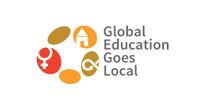|
Global Education Goes Local is a 36-month, international project supported through the Non-state Actors and Local Authorities Development Programme of the European Union (EuropeAid).
This project is being implemented in Cyprus by the Future Worlds Center, Bulgaria by the C.E.G.A. Foundation, Austria by Suedwind Steiermark, Lithuania by Global Citizens’ Academy/GCA, Slovenia by Institute for African Studies/IAS, and Spain by Cazalla Intercultural.
Overall objectives
The overall objective of the project is to foster commitment of European citizens to take an active role towards meeting the challenges of the interdependent world we live in, based on awareness and critical understanding of their two-way relations with the issues of global development. Sustainable Development Goals (SDGs) are a universal call to action to end poverty, protect the planet and ensure that all people enjoy peace and prosperity (see here). GEGL focuses on the following SDGs:
- 5: Gender Equality
- 11: Sustainable Cities and Communities
- 12: Responsible Consumption and Production
Specific objectives
- To foster the understanding of the interconnectedness between the developing countries and the European Union on the successful implementation of the SDGs with focus on goals 5, 11 and 12 among European citizens living in small localities;
- To increase the awareness of citizens in small localities, and especially young people, on the local and global dimensions of the SDGs with focus on goals 5, 11 and 12;
- To generate and promote new approaches and methodologies of engaging young people in global issues, particularly by utilising pop culture;
- To build capacity of actors in small localities to run quality global learning process with local communities and especially young people.
Target Groups
Educational and community bodies in small localities
- educational and community bodies/ structures from 30 target small localities
- other educational and community bodies/structures in small localities within the partner countries and beyond
General population in small localities
- those directly involved in local learning-action processes and global issues
- those who are approached and addressed by the actions of others
Young People in small localities (14-30 years old)
- young people directly engaged in learning processes in their localities
- young people directly engaged in national/ international activities (summer/winter schools, international summer school in the Global South)
Activities
Year 1
First step was to disseminate a declaration of interest form to local educational and community bodies in Cyprus. We decided that the most suitable regarding the target groups the project were:
Municipality of Athienou - Larnaca
Municipality of Ipsonas - Limassol
Municipality of Lefkara - Nicosia
Community Board of Episkopi -Limassol
Youth Center of Dali - Nicosia
Next step is the implementation of national, one week in a raw, training which will take place in Lefkara at 10 - 16 of June 2018. The training is expected to reach 3 participants from each locality, total number of 15 participants, and introduce them to the concept of Global Education, Sustainable Development Goals in general as well as the three main SDGs this project is dealing with in more depth. During the training, we must set the Youth Advisory Group. This group will be composed with 10 young people from different localities and they will be responsible for the online functioning, feed the respective partner and the resource development experts with trends, viral stories, music, series, vloggers and trendy concept in general. After the national training, one day training will run in each locality to further prepare them for the upcoming planning and running of the Learning - Action Process which must be done regarding the specific needs of each locality, their common practices and other practical issues.
Third step, after the implementation of the national and local trainings, an Online Environment Platform must be created to help all the localities to share their ideas. The development of the Learning - Action Processes from all of the localities will be separated in Round 1 actions and Round 2 actions. In Round 1, they have to create 5 workshops, 2 hours long and 15 participants to each one of them and one action which will engage at least 100 people per locality. In Round 2, the 5 workshops should reach at least 25 participants and the main action must engage at least 150 people per locality.
Expected Results
- Awareness and commitment on global issues connected to SDGs 5, 11 and 12 significantly increased in 30 small localities;
- Citizens in 30 small localities and especially young people engaged in learning and action around global issues;
- Innovative aproaches on engaging young people in global learning (connected to SDGs 5, 11 and 12) developed, tested and disseminated;
- Increased cappacity and competences among stakeholders on local level to further utilise global learning with local communities;
- Improved understanding of policy makers and influencers at local and national level for the value and approaches of global learning
